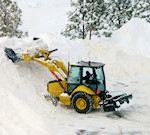Extreme Winter Weather Creates Blizzard of New Requirements

The Occupational Safety and Health Administration (OSHA) has much to say about how you need to keep employees safe when the winter winds are howling. Also, the Fair Labor Standards Act and state laws have spawned reams of rules on when you are obliged to pay workers if your operations are impacted by severe weather — at any time of the year.
According to OSHA, employers “have a duty to protect workers from recognized hazards, including cold stress hazards, that are causing or likely to cause death or serious physical harm in the workplace.” Presumably you would do so even without prodding from OSHA, but here are some of the measures this federal agency expects you to take.
First you need to train workers:
- how to recognize the environmental and workplace conditions that can lead to cold stress,
- the symptoms of cold stress, how to prevent it and what to do to assist those who are affected by it, and
- how to choose proper clothing for cold, wet and windy conditions.
OSHA Requirements
That’s not all. OSHA also expects you to:
- Monitor the physical condition of your workers.
- Schedule frequent short breaks where employees can be warm and dry.
- Schedule outdoor work during the warmest time of the day.
- Have employees work in pairs, that is, employ the “buddy system,” although presumably OSHA would not hold you to account if the nature of the work makes this entirely impractical (a doorman is one example). If you are in doubt, consult an attorney.
- Provide “warm sweet beverages,” perhaps hot cocoa or warm apple cider, but not alcoholic drinks.
- Provide “engineering controls” such as radiant heaters.
You’re not off the hook if all your employees work in heated offices. Although perhaps obvious, you need to be sure areas at your work location which employees must use to enter and exit your premises are not laden with deep snow or slip-inducing ice.
Naturally, there will be times when winter weather conditions are too overwhelming to open your doors for business. This contingency raises lots of questions about who you must pay if you declare a business closure. These questions are governed largely by the Department of Labor interpretation of the Fair Labor Standards Act.
Who Must be Paid?
The answer generally is determined by whether workers are exempt or non-exempt. Never lose sight of the fact that, while the Fair Labor Standards Act might seem demanding at times, your state laws might be far more demanding. With respect to non-exempt employees you are generally not required to pay them when they do not perform work, including a weather-induced shutdown. Of course, that doesn’t mean you can’t if you choose to, and you might have good reasons to do so.
Rules for exempt employees are a bit more complicated. In general, if the shutdown lasts less than a week, you are required to pay them, assuming those employees would be willing and able to report to work absent the shutdown. What if you don’t pay them? The basic threat is that those employees may no longer be considered exempt, and thus they will become entitled to overtime pay.
It is permissible, however, to count these non-working days against exempt employees’ vacation day allotment. Also, if you are open for business but an exempt employee is snowed in at his residence and can’t make it to work, you can dock the specific employee’s pay for that one day, if you choose to. Odds are you wouldn’t, however, unless you are in dire financial straits.
If you require an employee to be on call during a weather emergency, you might — or might not — be required to pay that employee. If being on call means essentially that the employee cannot do anything else, you are required to pay. On the other hand, if being on call does not restrict the employee’s ability to accomplish other things, you are not under that obligation.
Extra State Requirements
As noted, state laws can be more generous towards employees (exempt or otherwise). For example, New York, Massachusetts, California, New Jersey, Rhode Island, New Hampshire and the District of Columbia require that employees be paid a stipulated minimum amount if they arrive at work but perform no work. Oregon also has such a “show-up” law, although it only applies to minors. Don’t overlook whatever you have promised workers under a collective bargaining agreement.
Finally, weather-related closures have implications for employees’ permitted absences under the Family and Medical Leave Act (FMLA). If you are shut down for at least a week (whether due to weather or other reasons), those days do not reduce employees’ entitlement to 12 weeks of unpaid leave for FMLA-sanctioned purposes.
It gets a little stickier if the shutdown is for less than a week. FMLA regulations state: “The fact that a holiday may occur within the week taken as FMLA leave has no effect; the week is counted as a week of FMLA leave.” That interpretation also applies to employees out on family leave (for periods longer than one week) and for business closures less than one week, regardless of the purpose.
When employees are taking FMLA leave in periods of less than one week and the business is shut down sometime during that period, only the days that the business is open would count against the employee’s family leave allotment. For example, if an employee is out on leave on Tuesday, Wednesday and Thursday, but the business is closed on Wednesday due to bad weather, only Tuesday and Thursday are applied to that employee’s FMLA leave allotment.




